




1 March
 Stella Dallas. (Dir. Henry King. USA, 1925.) (Screening format – not known, 110mins) Stella Dallas, the working-class mother who makes the ultimate sacrifice for her socially ambitious daughter, became one of the most resonant figures in American culture from the moment Olive Higgins Prouty’s novel appeared in 1923. A stage adaptation soon followed, as did this film version in 1925 (the first of three). Produced by Samuel Goldwyn with a screenplay by Frances Marion and directed by Henry King, the
Stella Dallas. (Dir. Henry King. USA, 1925.) (Screening format – not known, 110mins) Stella Dallas, the working-class mother who makes the ultimate sacrifice for her socially ambitious daughter, became one of the most resonant figures in American culture from the moment Olive Higgins Prouty’s novel appeared in 1923. A stage adaptation soon followed, as did this film version in 1925 (the first of three). Produced by Samuel Goldwyn with a screenplay by Frances Marion and directed by Henry King, the  film is a powerful indictment of the rigid class barriers then emerging in the prosperous, postwar America of the 1920s, but the emotional center of the film is Stella (a brilliant portrayal by Belle Bennett, one of 73 actresses tested for the role), who marries “above her station” (to a temporarily embarrassed banker’s son) but is unable to adapt her dress and behavior to the bourgeois standards of her new husband. When her daughter becomes engaged to a fashionable country-clubber, Stella’s dilemma becomes painfully clear: Only by leaving her life can she ensure her daughter’s happiness. Find out more at Link. Presented by the Fleapit Cinema Club. With introduction by renowned film historian Kevin Brownlow. With live musical accompaniment by Stephen Horne. Westerham, Kent Link
film is a powerful indictment of the rigid class barriers then emerging in the prosperous, postwar America of the 1920s, but the emotional center of the film is Stella (a brilliant portrayal by Belle Bennett, one of 73 actresses tested for the role), who marries “above her station” (to a temporarily embarrassed banker’s son) but is unable to adapt her dress and behavior to the bourgeois standards of her new husband. When her daughter becomes engaged to a fashionable country-clubber, Stella’s dilemma becomes painfully clear: Only by leaving her life can she ensure her daughter’s happiness. Find out more at Link. Presented by the Fleapit Cinema Club. With introduction by renowned film historian Kevin Brownlow. With live musical accompaniment by Stephen Horne. Westerham, Kent Link
 Neil Brand Presents Laurel And Hardy After the national success of his long-running show ‘Neil Brand Presents Buster Keaton’, the composer/writer/broadcaster/musician returns with an all-new show about the immortal comedy duo recently portrayed in the hit film ‘Stan and Ollie’. Fully illustrated with stills, clips (both silent and sound) and Neil’s superlative piano accompaniment and culminating in two of the Boys’ best silent short films, Big Business and Liberty, this is a show that promises gales of laughter throughout, as well as getting under the skin of two warm, funny men who continue to make the world laugh when it needs it most. With live piano accompaniment by Neil Brand. Pavilion Theatre, Cromer Link
Neil Brand Presents Laurel And Hardy After the national success of his long-running show ‘Neil Brand Presents Buster Keaton’, the composer/writer/broadcaster/musician returns with an all-new show about the immortal comedy duo recently portrayed in the hit film ‘Stan and Ollie’. Fully illustrated with stills, clips (both silent and sound) and Neil’s superlative piano accompaniment and culminating in two of the Boys’ best silent short films, Big Business and Liberty, this is a show that promises gales of laughter throughout, as well as getting under the skin of two warm, funny men who continue to make the world laugh when it needs it most. With live piano accompaniment by Neil Brand. Pavilion Theatre, Cromer Link
2 March
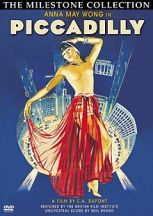 Piccadilly (Dir E A Dupont, UK, 1929) (Screening format – not known, 92 mins) A film noir before the term was in use, uncredited German director E.A. Dupont’s Piccadilly is one of the true greats of British silent films, on a par with the best of Anthony Asquith or Alfred Hitchcock during this period. Valentine Wilmot (Jameson Thomas) owns a nightclub featuring dancers Mabel (Gilda Gray) and Vic (Cyril Ritchard). After a confrontation with Wilmot, Vic quits performing at the club. When the joint starts losing business, a desperate Wilmot hires former dishwasher Shosho (Anna May Wong) as a dancer. She is an instant hit and forms a rapport with Wilmot, which makes both Mabel and Shosho’s friend (King Ho Chang) jealous, leading to a mysterious murder. A stylish evocation of Jazz Age London, with dazzlingly fluid cinematography and scenes ranging from the opulent West End to the seediness of Limehouse. One of the pinnacles of British silent cinema, Piccadilly is a sumptuous show business melodrama seething with sexual and racial tension – with an original screenplay by Arnold Bennett. Find out more at screenonline.org.uk . With recorded score by Neil Brand. Assembly Rooms, Ludlow Link
Piccadilly (Dir E A Dupont, UK, 1929) (Screening format – not known, 92 mins) A film noir before the term was in use, uncredited German director E.A. Dupont’s Piccadilly is one of the true greats of British silent films, on a par with the best of Anthony Asquith or Alfred Hitchcock during this period. Valentine Wilmot (Jameson Thomas) owns a nightclub featuring dancers Mabel (Gilda Gray) and Vic (Cyril Ritchard). After a confrontation with Wilmot, Vic quits performing at the club. When the joint starts losing business, a desperate Wilmot hires former dishwasher Shosho (Anna May Wong) as a dancer. She is an instant hit and forms a rapport with Wilmot, which makes both Mabel and Shosho’s friend (King Ho Chang) jealous, leading to a mysterious murder. A stylish evocation of Jazz Age London, with dazzlingly fluid cinematography and scenes ranging from the opulent West End to the seediness of Limehouse. One of the pinnacles of British silent cinema, Piccadilly is a sumptuous show business melodrama seething with sexual and racial tension – with an original screenplay by Arnold Bennett. Find out more at screenonline.org.uk . With recorded score by Neil Brand. Assembly Rooms, Ludlow Link
3 March
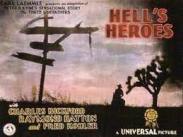 Hell’s Heroes (Dir.William Wyler, US, 1929) (Screening format – digital, 64mins) Made in both a silent and talkie version, Hell’s Heroes is a hard-boiled yet life-affirming Western about three bad men who, on fleeing a bank hold-up, encounter a dying woman and her new-born baby in the
Hell’s Heroes (Dir.William Wyler, US, 1929) (Screening format – digital, 64mins) Made in both a silent and talkie version, Hell’s Heroes is a hard-boiled yet life-affirming Western about three bad men who, on fleeing a bank hold-up, encounter a dying woman and her new-born baby in the  desolate Mojave Desert. Charles Bickford gives an astonishing performance as he balances death and redemption in this version of Peter B. Kyne’s frequently adapted story The Three Godfathers. William Wyler, whose films have won more Oscars than any other director, bridged the silent / sound era with his first great feature. The silent version remains the best. Find out more at silentfilm.org. Introduced by BFI National Archive Curator Bryony Dixon. With live musical accompaniment by Stephen Horne. BFI Southbank, London Link
desolate Mojave Desert. Charles Bickford gives an astonishing performance as he balances death and redemption in this version of Peter B. Kyne’s frequently adapted story The Three Godfathers. William Wyler, whose films have won more Oscars than any other director, bridged the silent / sound era with his first great feature. The silent version remains the best. Find out more at silentfilm.org. Introduced by BFI National Archive Curator Bryony Dixon. With live musical accompaniment by Stephen Horne. BFI Southbank, London Link
 Neil Brand Presents Laurel And Hardy After the national success of his long-running show ‘Neil Brand Presents Buster Keaton’, the composer/writer/broadcaster/musician returns with an all-new show about the immortal comedy duo recently portrayed in the hit film ‘Stan and Ollie’. Fully illustrated with stills, clips (both silent and sound) and Neil’s superlative piano accompaniment and culminating in two of the Boys’ best silent short films, Big Business and Liberty, this is a show that promises gales of laughter throughout, as well as getting under the skin of two warm, funny men who continue to make the world laugh when it needs it most. With live piano accompaniment by Neil Brand. Wyllyotts Theatre, Potters Bar Link
Neil Brand Presents Laurel And Hardy After the national success of his long-running show ‘Neil Brand Presents Buster Keaton’, the composer/writer/broadcaster/musician returns with an all-new show about the immortal comedy duo recently portrayed in the hit film ‘Stan and Ollie’. Fully illustrated with stills, clips (both silent and sound) and Neil’s superlative piano accompaniment and culminating in two of the Boys’ best silent short films, Big Business and Liberty, this is a show that promises gales of laughter throughout, as well as getting under the skin of two warm, funny men who continue to make the world laugh when it needs it most. With live piano accompaniment by Neil Brand. Wyllyotts Theatre, Potters Bar Link
6 March
Die Nibelungen – Part 2 : Kriemhild’s Revenge (Dir. Fritz Lange, Ger, 1924) (Screening format – not known, 130mins) To celebrate the centenary of Fritz Lang’s Die Nibelungen, the Austrian Cultural Forum is screening of both parts of Lang’s epic film: Siegfried and Kriemhild’s Revenge, in a beautifully restored version from the Friedrich Wilhelm Murnau Stiftug. Shot between 1922 and 1924 Die Nibelungen is truly epic in scale and ambition. Cutting edge technical innovation
– Part 2 : Kriemhild’s Revenge (Dir. Fritz Lange, Ger, 1924) (Screening format – not known, 130mins) To celebrate the centenary of Fritz Lang’s Die Nibelungen, the Austrian Cultural Forum is screening of both parts of Lang’s epic film: Siegfried and Kriemhild’s Revenge, in a beautifully restored version from the Friedrich Wilhelm Murnau Stiftug. Shot between 1922 and 1924 Die Nibelungen is truly epic in scale and ambition. Cutting edge technical innovation 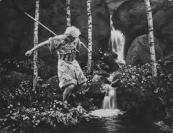 contributed enormously to the style and sweep of the story. Thea von Harbou’s script sought inspiration from the nordic saga (believed to be dated around 1200AD) rather than from the popular Wagner opera of the same title. Set designs and costumes are magnificent and unwaveringly modern. Find out more at wikipedia.org. With new recording of Gottfried Huppertz original score. Austrian Cultural Forum, London. Link
contributed enormously to the style and sweep of the story. Thea von Harbou’s script sought inspiration from the nordic saga (believed to be dated around 1200AD) rather than from the popular Wagner opera of the same title. Set designs and costumes are magnificent and unwaveringly modern. Find out more at wikipedia.org. With new recording of Gottfried Huppertz original score. Austrian Cultural Forum, London. Link
 Neil Brand Presents Laurel And Hardy After the national success of his long-running show ‘Neil Brand Presents Buster Keaton’, the composer/writer/broadcaster/musician returns with an all-new show about the immortal comedy duo recently portrayed in the hit film ‘Stan and Ollie’. Fully illustrated with stills, clips (both silent and sound) and Neil’s superlative piano accompaniment and culminating in two of the Boys’ best silent short films, Big Business and Liberty, this is a show that promises gales of laughter throughout, as well as getting under the skin of two warm, funny men who continue to make the world laugh when it needs it most. With live piano accompaniment by Neil Brand. Playhouse, Harlow Link
Neil Brand Presents Laurel And Hardy After the national success of his long-running show ‘Neil Brand Presents Buster Keaton’, the composer/writer/broadcaster/musician returns with an all-new show about the immortal comedy duo recently portrayed in the hit film ‘Stan and Ollie’. Fully illustrated with stills, clips (both silent and sound) and Neil’s superlative piano accompaniment and culminating in two of the Boys’ best silent short films, Big Business and Liberty, this is a show that promises gales of laughter throughout, as well as getting under the skin of two warm, funny men who continue to make the world laugh when it needs it most. With live piano accompaniment by Neil Brand. Playhouse, Harlow Link
9 March
 Piccadilly (Dir E A Dupont, UK, 1929) (Screening format – not known, 92 mins) A film noir before the term was in use, uncredited German director E.A. Dupont’s Piccadilly is one of the true greats of British silent films, on a par with the best of Anthony Asquith or Alfred Hitchcock during this period. Valentine Wilmot (Jameson Thomas) owns a nightclub featuring dancers Mabel (Gilda Gray) and Vic (Cyril Ritchard). After a confrontation with Wilmot, Vic quits performing at the club. When the joint starts losing business, a desperate Wilmot hires former dishwasher Shosho (Anna May Wong) as a dancer. She is an instant hit and forms a rapport with Wilmot, which makes both Mabel and Shosho’s friend (King Ho Chang) jealous, leading to a mysterious murder. A stylish evocation of Jazz Age London, with dazzlingly fluid cinematography and scenes ranging from the opulent West End to the seediness of Limehouse. One of the pinnacles of British silent cinema, Piccadilly is a sumptuous show business melodrama seething with sexual and racial tension – with an original screenplay by Arnold Bennett. Find out more at screenonline.org.uk . With recorded score by Neil Brand. The Courtford, Hereford Link
Piccadilly (Dir E A Dupont, UK, 1929) (Screening format – not known, 92 mins) A film noir before the term was in use, uncredited German director E.A. Dupont’s Piccadilly is one of the true greats of British silent films, on a par with the best of Anthony Asquith or Alfred Hitchcock during this period. Valentine Wilmot (Jameson Thomas) owns a nightclub featuring dancers Mabel (Gilda Gray) and Vic (Cyril Ritchard). After a confrontation with Wilmot, Vic quits performing at the club. When the joint starts losing business, a desperate Wilmot hires former dishwasher Shosho (Anna May Wong) as a dancer. She is an instant hit and forms a rapport with Wilmot, which makes both Mabel and Shosho’s friend (King Ho Chang) jealous, leading to a mysterious murder. A stylish evocation of Jazz Age London, with dazzlingly fluid cinematography and scenes ranging from the opulent West End to the seediness of Limehouse. One of the pinnacles of British silent cinema, Piccadilly is a sumptuous show business melodrama seething with sexual and racial tension – with an original screenplay by Arnold Bennett. Find out more at screenonline.org.uk . With recorded score by Neil Brand. The Courtford, Hereford Link
 Epic of Everest (Dir. J B L Noel, UK, 1924) (Screening format – not known, 85mins) A real adventure captured on film! The Epic of Everest is the official record of the fateful 1924 expedition to reach the summit. This third attempt to climb Everest culminated in the deaths of two of the finest climbers of their generation, George Mallory and Andrew Irvine, and sparked an on-going debate over whether or not they did indeed reach the summit. Filming in brutally harsh conditions with a specially adapted camera, Captain John Noel captured images of breathtaking beauty and considerable historic significance. This is the very earliest footage of the Himalayas and beautifully captures its untouched landscape in colour (tinted) film, while displaying the bravery of this group of British mountaineers and their Nepalese team. The film is also among the earliest filmed records of life in Tibet and features sequences at Phari Dzong (Pagri), Shekar Dzong (Xegar) and Rongbuk monastery. But what resonates so deeply is Noel’s ability to frame the vulnerability, isolation and courage of people persevering in one of the world’s harshest landscapes. Find out more at silentlondon.co.uk Presented by Northern Silents. With live musical accompaniment by Frame Ensemble. , Link
Epic of Everest (Dir. J B L Noel, UK, 1924) (Screening format – not known, 85mins) A real adventure captured on film! The Epic of Everest is the official record of the fateful 1924 expedition to reach the summit. This third attempt to climb Everest culminated in the deaths of two of the finest climbers of their generation, George Mallory and Andrew Irvine, and sparked an on-going debate over whether or not they did indeed reach the summit. Filming in brutally harsh conditions with a specially adapted camera, Captain John Noel captured images of breathtaking beauty and considerable historic significance. This is the very earliest footage of the Himalayas and beautifully captures its untouched landscape in colour (tinted) film, while displaying the bravery of this group of British mountaineers and their Nepalese team. The film is also among the earliest filmed records of life in Tibet and features sequences at Phari Dzong (Pagri), Shekar Dzong (Xegar) and Rongbuk monastery. But what resonates so deeply is Noel’s ability to frame the vulnerability, isolation and courage of people persevering in one of the world’s harshest landscapes. Find out more at silentlondon.co.uk Presented by Northern Silents. With live musical accompaniment by Frame Ensemble. , Link
10 March
 Piccadilly (Dir E A Dupont, UK, 1929) (Screening format – not known, 92 mins) A film noir before the term was in use, uncredited German director E.A. Dupont’s Piccadilly is one of the true greats of British silent films, on a par with the best of Anthony Asquith or Alfred Hitchcock during this period. Valentine Wilmot (Jameson Thomas) owns a nightclub featuring dancers Mabel (Gilda Gray) and Vic (Cyril Ritchard). After a confrontation with Wilmot, Vic quits performing at the club. When the joint starts losing business, a desperate Wilmot hires former dishwasher Shosho (Anna May Wong) as a dancer. She is an instant hit and forms a rapport with Wilmot, which makes both Mabel and Shosho’s friend (King Ho Chang) jealous, leading to a mysterious murder. A stylish evocation of Jazz Age London, with dazzlingly fluid cinematography and scenes ranging from the opulent West End to the seediness of Limehouse. One of the pinnacles of British silent cinema, Piccadilly is a sumptuous show business melodrama seething with sexual and racial tension – with an original screenplay by Arnold Bennett. Find out more at screenonline.org.uk . With recorded score by Neil Brand. Malvern Theatres,Malvern Link
Piccadilly (Dir E A Dupont, UK, 1929) (Screening format – not known, 92 mins) A film noir before the term was in use, uncredited German director E.A. Dupont’s Piccadilly is one of the true greats of British silent films, on a par with the best of Anthony Asquith or Alfred Hitchcock during this period. Valentine Wilmot (Jameson Thomas) owns a nightclub featuring dancers Mabel (Gilda Gray) and Vic (Cyril Ritchard). After a confrontation with Wilmot, Vic quits performing at the club. When the joint starts losing business, a desperate Wilmot hires former dishwasher Shosho (Anna May Wong) as a dancer. She is an instant hit and forms a rapport with Wilmot, which makes both Mabel and Shosho’s friend (King Ho Chang) jealous, leading to a mysterious murder. A stylish evocation of Jazz Age London, with dazzlingly fluid cinematography and scenes ranging from the opulent West End to the seediness of Limehouse. One of the pinnacles of British silent cinema, Piccadilly is a sumptuous show business melodrama seething with sexual and racial tension – with an original screenplay by Arnold Bennett. Find out more at screenonline.org.uk . With recorded score by Neil Brand. Malvern Theatres,Malvern Link
 Neil Brand Presents Laurel And Hardy After the national success of his long-running show ‘Neil Brand Presents Buster Keaton’, the composer/writer/broadcaster/musician returns with an all-new show about the immortal comedy duo recently portrayed in the hit film ‘Stan and Ollie’. Fully illustrated with stills, clips (both silent and sound) and Neil’s superlative piano accompaniment and culminating in two of the Boys’ best silent short films, Big Business and Liberty, this is a show that promises gales of laughter throughout, as well as getting under the skin of two warm, funny men who continue to make the world laugh when it needs it most. With live piano accompaniment by Neil Brand. Medina Theatre, Newport IOW Link
Neil Brand Presents Laurel And Hardy After the national success of his long-running show ‘Neil Brand Presents Buster Keaton’, the composer/writer/broadcaster/musician returns with an all-new show about the immortal comedy duo recently portrayed in the hit film ‘Stan and Ollie’. Fully illustrated with stills, clips (both silent and sound) and Neil’s superlative piano accompaniment and culminating in two of the Boys’ best silent short films, Big Business and Liberty, this is a show that promises gales of laughter throughout, as well as getting under the skin of two warm, funny men who continue to make the world laugh when it needs it most. With live piano accompaniment by Neil Brand. Medina Theatre, Newport IOW Link
13 March
 Neil Brand Presents Laurel And Hardy After the national success of his long-running show ‘Neil Brand Presents Buster Keaton’, the composer/writer/broadcaster/musician returns with an all-new show about the immortal comedy duo recently portrayed in the hit film ‘Stan and Ollie’. Fully illustrated with stills, clips (both silent and sound) and Neil’s superlative piano accompaniment and culminating in two of the Boys’ best silent short films, Big Business and Liberty, this is a show that promises gales of laughter throughout, as well as getting under the skin of two warm, funny men who continue to make the world laugh when it needs it most. With live piano accompaniment by Neil Brand. Brewhouse, Taunton Link
Neil Brand Presents Laurel And Hardy After the national success of his long-running show ‘Neil Brand Presents Buster Keaton’, the composer/writer/broadcaster/musician returns with an all-new show about the immortal comedy duo recently portrayed in the hit film ‘Stan and Ollie’. Fully illustrated with stills, clips (both silent and sound) and Neil’s superlative piano accompaniment and culminating in two of the Boys’ best silent short films, Big Business and Liberty, this is a show that promises gales of laughter throughout, as well as getting under the skin of two warm, funny men who continue to make the world laugh when it needs it most. With live piano accompaniment by Neil Brand. Brewhouse, Taunton Link
15 March
 Metropolis (Dir. Fritz Lang, 1927) (Screening format –not known , 149 mins ) Made in Germany during the Weimar period, Metropolis is set in a futuristic urban dystopia and follows the attempts of Freder (Gustav Frohlich), the wealthy son of the city’s ruler, and Maria (Brigitte Helm), a poor worker, to overcome the vast gulf separating the classes of their
Metropolis (Dir. Fritz Lang, 1927) (Screening format –not known , 149 mins ) Made in Germany during the Weimar period, Metropolis is set in a futuristic urban dystopia and follows the attempts of Freder (Gustav Frohlich), the wealthy son of the city’s ruler, and Maria (Brigitte Helm), a poor worker, to overcome the vast gulf separating the classes of their  city. Filming took place in 1925 at a cost of approximately five million Reichmarks, making it the most expensive film ever released up to that point. It is regarded as a pioneering work of science fiction and is among the most influential films of all time. Following its world premiere in 1927, half an hour was cut from Fritz Lang’s masterpiece and lost to the world. Eighty years later a spectacular discovery was made when the footage was found in a small, dusty museum in Buenos Aires. The film was then painstakingly reconstructed and digitally restored so that at last audiences could see the iconic futuristic fairy tale as Lang had envisioned it. Find out more at silentfilm.org Presented by Northern Silents. With live musical accompaniment by Jonny Best Hull Truck Theatre, Hull Link
city. Filming took place in 1925 at a cost of approximately five million Reichmarks, making it the most expensive film ever released up to that point. It is regarded as a pioneering work of science fiction and is among the most influential films of all time. Following its world premiere in 1927, half an hour was cut from Fritz Lang’s masterpiece and lost to the world. Eighty years later a spectacular discovery was made when the footage was found in a small, dusty museum in Buenos Aires. The film was then painstakingly reconstructed and digitally restored so that at last audiences could see the iconic futuristic fairy tale as Lang had envisioned it. Find out more at silentfilm.org Presented by Northern Silents. With live musical accompaniment by Jonny Best Hull Truck Theatre, Hull Link
16 March
 Do Detectives Think (Dir. Fred Guiol, US, 1927) + Big Business (Dir. James W Horne/Leo McCarey, US, 1928) (Screening format – not known, 19/19 mins). In Do Detectives Think when an escaped convict vows revenge on the judge who sentenced him, the judge engages a detective agency which sends its two best men, Laurel and Hardy, to protect him! Find out more at laurel-and-hardy.com Big Business sees Ollie and Stanley as two Christmas tree salesmen (in February!) who get into one of their usual mutual destruction fights with a homeowner. Find out more at wikipedia.org With live piano accompaniment by Forrester Pyke. Macrobert Arts Centre, Stirling Link
Do Detectives Think (Dir. Fred Guiol, US, 1927) + Big Business (Dir. James W Horne/Leo McCarey, US, 1928) (Screening format – not known, 19/19 mins). In Do Detectives Think when an escaped convict vows revenge on the judge who sentenced him, the judge engages a detective agency which sends its two best men, Laurel and Hardy, to protect him! Find out more at laurel-and-hardy.com Big Business sees Ollie and Stanley as two Christmas tree salesmen (in February!) who get into one of their usual mutual destruction fights with a homeowner. Find out more at wikipedia.org With live piano accompaniment by Forrester Pyke. Macrobert Arts Centre, Stirling Link
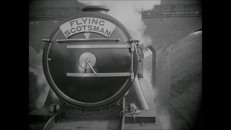 The Flying Scotsman (Dir. Castleton Knight, UK, 1929) (Screening format – not known, 85mins) Rare screening of the original, fully silent version of this cracking nail-biter, filmed on board the most iconic train in British railway history. The Flying Scotsman was just six years old when it starred in Castleton Knight’s runaway train thriller on its journey from London to Edinburgh. When a vengeful stoker attempts to
The Flying Scotsman (Dir. Castleton Knight, UK, 1929) (Screening format – not known, 85mins) Rare screening of the original, fully silent version of this cracking nail-biter, filmed on board the most iconic train in British railway history. The Flying Scotsman was just six years old when it starred in Castleton Knight’s runaway train thriller on its journey from London to Edinburgh. When a vengeful stoker attempts to  sabotage Old Bob’s final day working on board the mighty steam train, he hadn’t counted on Bob’s daughter (Pauline Johnson) who discovers the plot and boards the train to save the day. Filmed on the Hertford loop line, the action features plenty of footplate close-ups and daredevil shots of Johnson performing her own stunts edging along the narrow running board in heels. Although superseded by the part-talkie release, the silent version is in many ways even more enjoyable thanks to some delightful moments, bonus shots and more satisfying character development. Find out more at heyuguys.com . Presented as part of the Hippodrome Silent Film Festival. With live musical accompaniment by Jane Gardner . Barony Theatre, Bo’Ness Link
sabotage Old Bob’s final day working on board the mighty steam train, he hadn’t counted on Bob’s daughter (Pauline Johnson) who discovers the plot and boards the train to save the day. Filmed on the Hertford loop line, the action features plenty of footplate close-ups and daredevil shots of Johnson performing her own stunts edging along the narrow running board in heels. Although superseded by the part-talkie release, the silent version is in many ways even more enjoyable thanks to some delightful moments, bonus shots and more satisfying character development. Find out more at heyuguys.com . Presented as part of the Hippodrome Silent Film Festival. With live musical accompaniment by Jane Gardner . Barony Theatre, Bo’Ness Link
19 March
 Neil Brand Presents Laurel And Hardy After the national success of his long-running show ‘Neil Brand Presents Buster Keaton’, the composer/writer/broadcaster/musician returns with an all-new show about the immortal comedy duo recently portrayed in the hit film ‘Stan and Ollie’. Fully illustrated with stills, clips (both silent and sound) and Neil’s superlative piano accompaniment and culminating in two of the Boys’ best silent short films, Big Business and Liberty, this is a show that promises gales of laughter throughout, as well as getting under the skin of two warm, funny men who continue to make the world laugh when it needs it most. With live piano accompaniment by Neil Brand. Forum, Barrow Link
Neil Brand Presents Laurel And Hardy After the national success of his long-running show ‘Neil Brand Presents Buster Keaton’, the composer/writer/broadcaster/musician returns with an all-new show about the immortal comedy duo recently portrayed in the hit film ‘Stan and Ollie’. Fully illustrated with stills, clips (both silent and sound) and Neil’s superlative piano accompaniment and culminating in two of the Boys’ best silent short films, Big Business and Liberty, this is a show that promises gales of laughter throughout, as well as getting under the skin of two warm, funny men who continue to make the world laugh when it needs it most. With live piano accompaniment by Neil Brand. Forum, Barrow Link
20 March
 Peggy (Dir. Charles Giblyn/Thomas H. Ince, US , 1916 ) + short ( Screening format – not known, 43mins) The sparkling film debut of Billie Burke (who would go on to be immortalised for her role as Glinda, the Good Witch in MGM’s The Wizard of Oz) playing an American heiress reluctantly transplanted to rural Scotland. New York socialite Peggy Cameron (Billie Burke) is dismayed to learn that she must move to Scotland to live with her new guardian… “a man as stern and unyielding as the rocky hills of his native land”. The censorious village elders prove to be no match for Peggy, whose boisterous demeanour and unapologetic ideals will have you cheering in the aisles. But will she succumb to the charms of the local ‘hot’ Reverend? Once thought lost, the film has been reconstructed, although the final reel has not survived in any form. The missing scenes have been filled in with stills and text from the 1916 copyright registration to ensure that today’s audiences are not left in suspense at the film’s conclusion. Find out more at catalog.afi.com . Presented as part of the Hippodrome Silent Film Festival. With live musical accompaniment by Stephen Horne. Hippodrome Cinema, Bo’ness Link
Peggy (Dir. Charles Giblyn/Thomas H. Ince, US , 1916 ) + short ( Screening format – not known, 43mins) The sparkling film debut of Billie Burke (who would go on to be immortalised for her role as Glinda, the Good Witch in MGM’s The Wizard of Oz) playing an American heiress reluctantly transplanted to rural Scotland. New York socialite Peggy Cameron (Billie Burke) is dismayed to learn that she must move to Scotland to live with her new guardian… “a man as stern and unyielding as the rocky hills of his native land”. The censorious village elders prove to be no match for Peggy, whose boisterous demeanour and unapologetic ideals will have you cheering in the aisles. But will she succumb to the charms of the local ‘hot’ Reverend? Once thought lost, the film has been reconstructed, although the final reel has not survived in any form. The missing scenes have been filled in with stills and text from the 1916 copyright registration to ensure that today’s audiences are not left in suspense at the film’s conclusion. Find out more at catalog.afi.com . Presented as part of the Hippodrome Silent Film Festival. With live musical accompaniment by Stephen Horne. Hippodrome Cinema, Bo’ness Link
 The Rugged Island: A Shetland Lyric (Dir. Jenny Gilbertson (née Brown), UK, 1933) (Screening format – not known, 60 mins + short) Pioneering Glasgow-born filmmaker Jenny Gilbertson directs this poignant “story documentary” about crofting families in Shetland. Jenny’s husband-to-be plays Johnny: a young man torn between his duty to home and his love for Enga, with the
The Rugged Island: A Shetland Lyric (Dir. Jenny Gilbertson (née Brown), UK, 1933) (Screening format – not known, 60 mins + short) Pioneering Glasgow-born filmmaker Jenny Gilbertson directs this poignant “story documentary” about crofting families in Shetland. Jenny’s husband-to-be plays Johnny: a young man torn between his duty to home and his love for Enga, with the 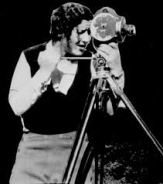 promise of a new life in Australia. Hailed by John Grierson – father of the British documentary movement – as “one of the best descriptions of life in the country anybody has yet made”, this tender and beautiful dramatisation of Shetland life surpasses the bounds of both fiction and non-fiction filmmaking. Find out more at screenonline.org.uk Presented as part of the Hippodrome Silent Film Festival. Introduced by Janet McBain, former Curator and Founder of the Scottish Screen Archive. With live musical accompaniment by Inge Thomson and Catriona MacDonald with the world premiere of a new music commission. Hippodrome Cinema, Bo’ness Link (NB Also available to watch on-line)
promise of a new life in Australia. Hailed by John Grierson – father of the British documentary movement – as “one of the best descriptions of life in the country anybody has yet made”, this tender and beautiful dramatisation of Shetland life surpasses the bounds of both fiction and non-fiction filmmaking. Find out more at screenonline.org.uk Presented as part of the Hippodrome Silent Film Festival. Introduced by Janet McBain, former Curator and Founder of the Scottish Screen Archive. With live musical accompaniment by Inge Thomson and Catriona MacDonald with the world premiere of a new music commission. Hippodrome Cinema, Bo’ness Link (NB Also available to watch on-line)
 The Argyle Case (Dir. Ralph Ince, US, 1917) (Screening format – 35mm, 70mins). Wikipedia lists The Argyle Case as a ‘lost film’, so what do they know! When multi-millionaire banker John Argyle is found brutally murdered in his home, suspicions are cast upon
The Argyle Case (Dir. Ralph Ince, US, 1917) (Screening format – 35mm, 70mins). Wikipedia lists The Argyle Case as a ‘lost film’, so what do they know! When multi-millionaire banker John Argyle is found brutally murdered in his home, suspicions are cast upon  Mary Mazuret, his adopted daughter who became the sole beneficiary of his estate under his will, Argyle having quarrelled with his son Bruce. Just as the case begins to look black for Mary, Asche Kayton, a great private detective, is called in by Bruce and takes hold of the investigation. His methods are scientific and swift and the trail leads
Mary Mazuret, his adopted daughter who became the sole beneficiary of his estate under his will, Argyle having quarrelled with his son Bruce. Just as the case begins to look black for Mary, Asche Kayton, a great private detective, is called in by Bruce and takes hold of the investigation. His methods are scientific and swift and the trail leads  to…..well, that would be telling! The Argyle Case was based on a play by Harvey J. O’Higgins and Harriet Ford, which in turn was inspired by the official files of the William J. Burns Agency, an international private detective organization. Robert Warwick (who also produced) plays the scientific detective who brings the miscreants to heel. The Argyle Case was directed by Ralph Ince, brother of silent-movie mogul Thomas Ince. The film would be remade as a talkie in 1929, with Thomas Meighan in the lead. Find out more at imdb.com Presented by the Kennington Bioscope. With live musical accompaniment. Cinema Museum, Lambeth. Link
to…..well, that would be telling! The Argyle Case was based on a play by Harvey J. O’Higgins and Harriet Ford, which in turn was inspired by the official files of the William J. Burns Agency, an international private detective organization. Robert Warwick (who also produced) plays the scientific detective who brings the miscreants to heel. The Argyle Case was directed by Ralph Ince, brother of silent-movie mogul Thomas Ince. The film would be remade as a talkie in 1929, with Thomas Meighan in the lead. Find out more at imdb.com Presented by the Kennington Bioscope. With live musical accompaniment. Cinema Museum, Lambeth. Link
21 March
 The King of Kings (Dir. Cecil B DeMille, US, 1927) (Screening format – not known, 155mins) The King of Kings is the Greatest Story Ever Told as only Cecil B. DeMille could tell it. In 1927, working with one of the biggest budgets in Hollywood history, DeMille spun the life and Passion of Christ into a silent-era blockbuster. Featuring text drawn directly from the Bible, a cast of thousands, and the great showman’s singular cinematic bag of tricks, The King of Kings is at once spectacular and deeply reverent—part Gospel, part Technicolor epic. The King of Kings was first released in the spring of 1927, and it was the middle chapter in a sort of informal biblical trilogy that DeMille produced, beginning with the original, silent version of The Ten Commandments (1923) and ending with the early talkie The Sign of the Cross (1932), which depicts Nero’s persecution of the early Christians. Despite being a silent film itself, The King of Kings remained popular well into the sound era, so much so that no other major Hollywood movie about the life of Christ was made for over 30 years, until Nicholas Ray directed the similarly-titled King of Kings in 1961. Find out more at imdb.com. With live organ accompaniment by Nigel Allcoat. Birmingham Cathedral Link
The King of Kings (Dir. Cecil B DeMille, US, 1927) (Screening format – not known, 155mins) The King of Kings is the Greatest Story Ever Told as only Cecil B. DeMille could tell it. In 1927, working with one of the biggest budgets in Hollywood history, DeMille spun the life and Passion of Christ into a silent-era blockbuster. Featuring text drawn directly from the Bible, a cast of thousands, and the great showman’s singular cinematic bag of tricks, The King of Kings is at once spectacular and deeply reverent—part Gospel, part Technicolor epic. The King of Kings was first released in the spring of 1927, and it was the middle chapter in a sort of informal biblical trilogy that DeMille produced, beginning with the original, silent version of The Ten Commandments (1923) and ending with the early talkie The Sign of the Cross (1932), which depicts Nero’s persecution of the early Christians. Despite being a silent film itself, The King of Kings remained popular well into the sound era, so much so that no other major Hollywood movie about the life of Christ was made for over 30 years, until Nicholas Ray directed the similarly-titled King of Kings in 1961. Find out more at imdb.com. With live organ accompaniment by Nigel Allcoat. Birmingham Cathedral Link
 Sound Tracks: The Flying Scotsman And Britain’s ‘Part Talkies’ Silent films – with sound? As the talkie craze swept the world at the end of the 1920s, a number of film studios hit on the idea of adding sound sequences to selected sections of their recently completed silent films – some more convincingly than others! Thus was born the (very short-lived) phenomenon of the ‘part-talkie’ which, though often maligned as neither fish nor fowl, can perhaps be seen as an art form in its own right. Productions from this transitional era included Victor Saville’s Kitty – Britain’s first part-talkie, which premiered a full fortnight ahead of Hitchcock’s Blackmail – whilst the silent version of The Flying Scotsman was transformed by both new sound and silent footage into a hybrid work built equally around its hair-raising stunts and the novelty of dialogue. Join writer and self-declared ‘film nerd’ Marc David Jacobs for this generously-illustrated presentation featuring clips from rarely-seen films, some eyebrow-raising news cuttings, and even The Old Sussex Pig Song! Presented as part of the Hippodrome Silent Film Festival. Introduced by Marc David Jacobs. With live musical accompaniment by Jane Gardner. Hippodrome Cinema, Bo’ness Link (NB Also available to watch on-line)
Sound Tracks: The Flying Scotsman And Britain’s ‘Part Talkies’ Silent films – with sound? As the talkie craze swept the world at the end of the 1920s, a number of film studios hit on the idea of adding sound sequences to selected sections of their recently completed silent films – some more convincingly than others! Thus was born the (very short-lived) phenomenon of the ‘part-talkie’ which, though often maligned as neither fish nor fowl, can perhaps be seen as an art form in its own right. Productions from this transitional era included Victor Saville’s Kitty – Britain’s first part-talkie, which premiered a full fortnight ahead of Hitchcock’s Blackmail – whilst the silent version of The Flying Scotsman was transformed by both new sound and silent footage into a hybrid work built equally around its hair-raising stunts and the novelty of dialogue. Join writer and self-declared ‘film nerd’ Marc David Jacobs for this generously-illustrated presentation featuring clips from rarely-seen films, some eyebrow-raising news cuttings, and even The Old Sussex Pig Song! Presented as part of the Hippodrome Silent Film Festival. Introduced by Marc David Jacobs. With live musical accompaniment by Jane Gardner. Hippodrome Cinema, Bo’ness Link (NB Also available to watch on-line)
 Stella Maris (Dir. Marshall Neilan, US, 1918) (Screening format – not known, 80mins) Mary Pickford plays dual roles in this major advancement in filmmaking and a major change from anything the star had done before. Stella Maris, based on William John Locke’s 1913 novel, tells the story of two, very different young women, both played by Pickford. Stella Maris is a beautiful, crippled girl who is cared for by her rich family, who shield her from the harsh realities of the world. Unity Blake, in
Stella Maris (Dir. Marshall Neilan, US, 1918) (Screening format – not known, 80mins) Mary Pickford plays dual roles in this major advancement in filmmaking and a major change from anything the star had done before. Stella Maris, based on William John Locke’s 1913 novel, tells the story of two, very different young women, both played by Pickford. Stella Maris is a beautiful, crippled girl who is cared for by her rich family, who shield her from the harsh realities of the world. Unity Blake, in 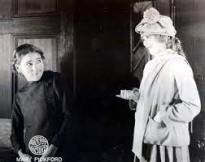 contrast, is a poor, uneducated orphan whose mistreatment as a child has left her afraid of everyone. Both young women fall in love with John, a well-known journalist and a friend of the Maris family. But John does not let on that he is already (unhappily) married. Melodrama upon melodrama can only follow! .Director Neilan and cinematographer Walter Stradling created some trick photography for Mary to play both roles, using double exposure photography and complex editing which made it possible to present both characters on screen simultaneously. A true masterclass on acting, directing and cinematography. Find out more at Moviessilently.com Presented as part of the Hippodrome Silent Film Festival. With pre-recorded introduction Pamela Hutchinson With live musical accompaniment by Meg Morley. Hippodrome Cinema, Bo’ness Link (NB Also available to watch on-line)
contrast, is a poor, uneducated orphan whose mistreatment as a child has left her afraid of everyone. Both young women fall in love with John, a well-known journalist and a friend of the Maris family. But John does not let on that he is already (unhappily) married. Melodrama upon melodrama can only follow! .Director Neilan and cinematographer Walter Stradling created some trick photography for Mary to play both roles, using double exposure photography and complex editing which made it possible to present both characters on screen simultaneously. A true masterclass on acting, directing and cinematography. Find out more at Moviessilently.com Presented as part of the Hippodrome Silent Film Festival. With pre-recorded introduction Pamela Hutchinson With live musical accompaniment by Meg Morley. Hippodrome Cinema, Bo’ness Link (NB Also available to watch on-line)
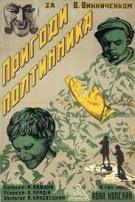 Adventures Of A Half Ruble (Dir. Aksel Lundin, USSR, 1929) (Screening format – not known. 69mins) This is a charming adaptation of the children’s stories Fedko Khalamydnyk by political activist, writer, playwright and artist Volodymyr
Adventures Of A Half Ruble (Dir. Aksel Lundin, USSR, 1929) (Screening format – not known. 69mins) This is a charming adaptation of the children’s stories Fedko Khalamydnyk by political activist, writer, playwright and artist Volodymyr  Vynnychenko, who served as the first prime minister of the Ukrainian People’s Republic. Vynnychenko’s works were banned from the 1930s until the mid-1980s but he is now recognized as pre-revolutionary Ukraine’s leading modernist writer.The film follows the exploits of young Fedko – valiant leader of a rabble of downtrodden children whose playground is the snowy streets and icy rivers of Kyiv (redolent of Kaufman’s In Spring, ). Constantly feuding with the mean-spirited “Manager” and his spoiled son, Fedko must keep his wits about him to get by. Find out more at vufku.org Presented as part of the Hippodrome Silent Film Festival. With live musical accompaniment by John Sweeney. Hippodrome Cinema, Bo’ness Link
Vynnychenko, who served as the first prime minister of the Ukrainian People’s Republic. Vynnychenko’s works were banned from the 1930s until the mid-1980s but he is now recognized as pre-revolutionary Ukraine’s leading modernist writer.The film follows the exploits of young Fedko – valiant leader of a rabble of downtrodden children whose playground is the snowy streets and icy rivers of Kyiv (redolent of Kaufman’s In Spring, ). Constantly feuding with the mean-spirited “Manager” and his spoiled son, Fedko must keep his wits about him to get by. Find out more at vufku.org Presented as part of the Hippodrome Silent Film Festival. With live musical accompaniment by John Sweeney. Hippodrome Cinema, Bo’ness Link
 The Constant Nymph (Dir. Basil Dean, UK, 1928) (Screening format – not known, 110 mins) This is the first of three film versions of Margaret Kennedy’s controversial 1924 novel The Constant Nymph, with a screenplay by Alma Reville and marking Basil Dean’s debut as director. Mabel Poulton plays the title character, an impressionable young girl named Tessa, who falls in love with brilliant but impoverished composer Lewis Dodd (Ivor Novello). Dodd, however, barely
The Constant Nymph (Dir. Basil Dean, UK, 1928) (Screening format – not known, 110 mins) This is the first of three film versions of Margaret Kennedy’s controversial 1924 novel The Constant Nymph, with a screenplay by Alma Reville and marking Basil Dean’s debut as director. Mabel Poulton plays the title character, an impressionable young girl named Tessa, who falls in love with brilliant but impoverished composer Lewis Dodd (Ivor Novello). Dodd, however, barely 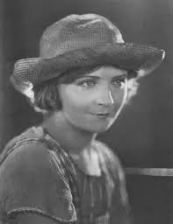 acknowledges Tessa’s existence, preferring instead the company of the older, prettier and wealthier Paulina (Dorothy Boyd). Only when it is nearly too late does Dodd realize how much he loves Tessa and how the girl has influenced his finest musical work. Initially arousing concern from the censors over Poulten’s portrayl of 16 year old Tessa, they relented on learning that Poulten was in fact 26. The film was long thought lost until a copy was found as a result of a 1992 British Film Institute campaign to locate missing movies. Find out more at screenonline.org.uk Presented as part of a day celebrating the life of Mabel Poulton and the centenary of the release of the (sadly now lost) film Moonbeam magic (1924). With recorded score. Rio Cinema, Dalston Link
acknowledges Tessa’s existence, preferring instead the company of the older, prettier and wealthier Paulina (Dorothy Boyd). Only when it is nearly too late does Dodd realize how much he loves Tessa and how the girl has influenced his finest musical work. Initially arousing concern from the censors over Poulten’s portrayl of 16 year old Tessa, they relented on learning that Poulten was in fact 26. The film was long thought lost until a copy was found as a result of a 1992 British Film Institute campaign to locate missing movies. Find out more at screenonline.org.uk Presented as part of a day celebrating the life of Mabel Poulton and the centenary of the release of the (sadly now lost) film Moonbeam magic (1924). With recorded score. Rio Cinema, Dalston Link
22 March
 How To Be A Flapper – The Wonderful World Of Eve’s Film Review Learn how to Charleston from the comfort of your cinema seat! Receive guidance on the correct way to wear a cloche hat and how to prevent getting mud spots on your stockings. Glean ideas for brightening up boring parties and watch “Resista” altering her weight at will. This is the kind of joyful entertainment the wonderful cinemagazine Eve’s Film Review provides. These weekly releases graced cinema screens between 1921 and 1933 and celebrated women at work and play. Hobbies, passions and simple pleasures were celebrated with great glee, and there is much for the modern audience to enjoy too, men included. Come and enjoy a sample of these gloriously entertaining short films presented by film archivist Jenny Hammerton. You might be inspired to take up women’s football or wing-walking! Presented as part of the Hippodrome Silent Film Festival. Introduced by film archivist Jenny Hammerton. With live musical accompaniment by Meg Morley. Hippodrome Cinema, Bo’ness Link (NB Also available to watch on-line)
How To Be A Flapper – The Wonderful World Of Eve’s Film Review Learn how to Charleston from the comfort of your cinema seat! Receive guidance on the correct way to wear a cloche hat and how to prevent getting mud spots on your stockings. Glean ideas for brightening up boring parties and watch “Resista” altering her weight at will. This is the kind of joyful entertainment the wonderful cinemagazine Eve’s Film Review provides. These weekly releases graced cinema screens between 1921 and 1933 and celebrated women at work and play. Hobbies, passions and simple pleasures were celebrated with great glee, and there is much for the modern audience to enjoy too, men included. Come and enjoy a sample of these gloriously entertaining short films presented by film archivist Jenny Hammerton. You might be inspired to take up women’s football or wing-walking! Presented as part of the Hippodrome Silent Film Festival. Introduced by film archivist Jenny Hammerton. With live musical accompaniment by Meg Morley. Hippodrome Cinema, Bo’ness Link (NB Also available to watch on-line)
 Just Around The Corner (Dir. Francis Marion, US, 1921) (Screening format – not known, 80mins) As well as an illustrious career as a screenwriter, Frances Marion is credited as sole director on two feature films, including this rare example of a 1920s film with a woman officially occupying the director’s chair. On New York’s ghettoised Lower East Side, impoverished widow
Just Around The Corner (Dir. Francis Marion, US, 1921) (Screening format – not known, 80mins) As well as an illustrious career as a screenwriter, Frances Marion is credited as sole director on two feature films, including this rare example of a 1920s film with a woman officially occupying the director’s chair. On New York’s ghettoised Lower East Side, impoverished widow  Ma Birdsong, is decent, hardworking, and devoted to her two children – Jimmie and Essie (played by Sigrid Holmquist “the Swedish Mary Pickford”). Ma wishes nothing more than to see her daughter marry a “good man” who will look after her, and for Jimmie to get an honest job. But Essie’s naivety leaves her vulnerable to a caddish suitor who threatens to dash their mother’s hopes. This unabashedly sentimental drama about maternal love and the trials of navigating a man’s world is a tantalising glimpse of another dimension of Marion’s unparalleled gift for movie making. Find out more at ithankyouarthur.blogspot.com Presented as part of the Hippodrome Silent Film Festival. With live musical accompaniment by Maud Nelissen. Hippodrome Cinema, Bo’ness Link (NB Also available to watch on-line)
Ma Birdsong, is decent, hardworking, and devoted to her two children – Jimmie and Essie (played by Sigrid Holmquist “the Swedish Mary Pickford”). Ma wishes nothing more than to see her daughter marry a “good man” who will look after her, and for Jimmie to get an honest job. But Essie’s naivety leaves her vulnerable to a caddish suitor who threatens to dash their mother’s hopes. This unabashedly sentimental drama about maternal love and the trials of navigating a man’s world is a tantalising glimpse of another dimension of Marion’s unparalleled gift for movie making. Find out more at ithankyouarthur.blogspot.com Presented as part of the Hippodrome Silent Film Festival. With live musical accompaniment by Maud Nelissen. Hippodrome Cinema, Bo’ness Link (NB Also available to watch on-line)
 Mantrap (Dir. Victor Fleming, US, 1926) (Screening format – not known, 71mins + short) Clara Bow, the quientisential ‘It’ girl, certainly flaunts ‘It’ in this masterpiece of Roaring Twenties flapper comedy. In the film, country-dwelling Joe (played by Edinburgh-born Ernest Torrence) heads to the big city seeking female company
Mantrap (Dir. Victor Fleming, US, 1926) (Screening format – not known, 71mins + short) Clara Bow, the quientisential ‘It’ girl, certainly flaunts ‘It’ in this masterpiece of Roaring Twenties flapper comedy. In the film, country-dwelling Joe (played by Edinburgh-born Ernest Torrence) heads to the big city seeking female company  where he encounters flirtatious beauty Alverna (Bow). Alverna makes eyes at Joe (“How she vamps with her lamps,” wrote the Variety critic of the day) and Joe is instantly smitten – whisking her home to the backwoods town of Mantrap as his wife. But small town life doesn’t suit Alverna, and Joe soon learns he has taken on more than he had bargained for. By 1926 Clara Bow had already appeared in more than two dozen films, but Mantrap would
where he encounters flirtatious beauty Alverna (Bow). Alverna makes eyes at Joe (“How she vamps with her lamps,” wrote the Variety critic of the day) and Joe is instantly smitten – whisking her home to the backwoods town of Mantrap as his wife. But small town life doesn’t suit Alverna, and Joe soon learns he has taken on more than he had bargained for. By 1926 Clara Bow had already appeared in more than two dozen films, but Mantrap would  prove to be her breakout vehicle, and it’s not hard to see why. The film is based on a prestigious source, a novel by celebrated American author Sinclair Lewis, for which Paramount paid $50,000 (compared with $750 a week to Bow). Sinclair Lewis would be awarded the Nobel Prize in Literature four years later, no doubt in spite of, rather than because of his novel, but while the novel may now be largely forgotten, the film, and particularly Clara Bow’s performance will live forever. Find out more at silentfilm.org Presented as part of the Hippodrome Silent Film Festival. With live musical accompaniment by Neil Brand. Hippodrome Cinema, Bo’ness Link
prove to be her breakout vehicle, and it’s not hard to see why. The film is based on a prestigious source, a novel by celebrated American author Sinclair Lewis, for which Paramount paid $50,000 (compared with $750 a week to Bow). Sinclair Lewis would be awarded the Nobel Prize in Literature four years later, no doubt in spite of, rather than because of his novel, but while the novel may now be largely forgotten, the film, and particularly Clara Bow’s performance will live forever. Find out more at silentfilm.org Presented as part of the Hippodrome Silent Film Festival. With live musical accompaniment by Neil Brand. Hippodrome Cinema, Bo’ness Link
23 March
 Steamboat Bill Jr (Dir. Buster Keaton/Charles Reisner, US, 1928) (Screening format – not known, 71 mins) In Steamboat Bill Jr a crusty river boat captain hopes that his long departed son’s return will help him compete with a business rival. Unfortunately, William Canfield Jnr (Buster Keaton) is an effete college boy. Worse still, he has fallen for the business rival’s daughter (Marion Byron). Featuring some of Buster’s finest and most dangerous stunts, it’s a health and safety nightmare maybe but it’s entertainment that will live forever. The final storm sequence is still as breathtaking today as it was on first release. Not a commercial success at the time, this is now rightly regarded as a Keaton classic. Find out more at Wikipedia Presented as part of the Hippodrome Silent Film Festival. With live musical accompaniment by John Sweeney. Hippodrome Cinema, Bo’ness Link
Steamboat Bill Jr (Dir. Buster Keaton/Charles Reisner, US, 1928) (Screening format – not known, 71 mins) In Steamboat Bill Jr a crusty river boat captain hopes that his long departed son’s return will help him compete with a business rival. Unfortunately, William Canfield Jnr (Buster Keaton) is an effete college boy. Worse still, he has fallen for the business rival’s daughter (Marion Byron). Featuring some of Buster’s finest and most dangerous stunts, it’s a health and safety nightmare maybe but it’s entertainment that will live forever. The final storm sequence is still as breathtaking today as it was on first release. Not a commercial success at the time, this is now rightly regarded as a Keaton classic. Find out more at Wikipedia Presented as part of the Hippodrome Silent Film Festival. With live musical accompaniment by John Sweeney. Hippodrome Cinema, Bo’ness Link
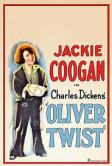 Oliver Twist (Dir. Frank Lloyd, US, 1922) (Screening format – not known, 74mins) Thought lost for decades, Frank Lloyd’s adaptation of Charles Dicken’s classic tale of the boy who asked for more has an all-star cast. Starring the man of a thousand faces, Lon Chaney, as Fagin and the wunderkind of 1920s Hollywood, Jackie Coogan (straight after his heartrending debut in Chaplin’s The Kid) in the title role, this spectacular silent film gem was rediscovered in Yugoslavia in the 1970s. Find out more at editoreric.com. Presented as part of the Hippodrome Silent Film Festival. With live musical accompaniment by Neil Brand. Hippodrome Cinema, Bo’ness Link
Oliver Twist (Dir. Frank Lloyd, US, 1922) (Screening format – not known, 74mins) Thought lost for decades, Frank Lloyd’s adaptation of Charles Dicken’s classic tale of the boy who asked for more has an all-star cast. Starring the man of a thousand faces, Lon Chaney, as Fagin and the wunderkind of 1920s Hollywood, Jackie Coogan (straight after his heartrending debut in Chaplin’s The Kid) in the title role, this spectacular silent film gem was rediscovered in Yugoslavia in the 1970s. Find out more at editoreric.com. Presented as part of the Hippodrome Silent Film Festival. With live musical accompaniment by Neil Brand. Hippodrome Cinema, Bo’ness Link
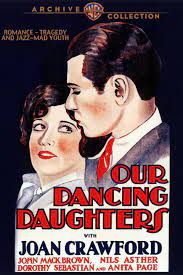 Our Dancing Daughters (Dir. Harry Beaumont, US, 1928) (Screening format – not known, 83mins) In Our Dancing Daughters, Joan Crawford stripped to her teddy and tore into a Charleston powered by a zillion watts of sexual energy – and shocked the corsets and cravats off parents who’d heard disturbing rumblings of what their children were up to. But the younger generation couldn’t get enough: they’d found their icon of Flaming Youth. Crawford became a star in this milestone silent about a good girl who hides her heart behind a party-girl mask and loses the man she
Our Dancing Daughters (Dir. Harry Beaumont, US, 1928) (Screening format – not known, 83mins) In Our Dancing Daughters, Joan Crawford stripped to her teddy and tore into a Charleston powered by a zillion watts of sexual energy – and shocked the corsets and cravats off parents who’d heard disturbing rumblings of what their children were up to. But the younger generation couldn’t get enough: they’d found their icon of Flaming Youth. Crawford became a star in this milestone silent about a good girl who hides her heart behind a party-girl mask and loses the man she 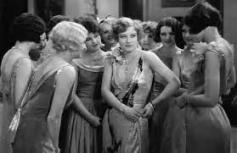 loves to a gold digger. The film’s portrait of a fascinating (and a bit frightening) breed of young women who match men drink for drink and vice for vice was so popular it bred two similarly themed movies: Our Modern Maidens and Our Blushing Brides. After the film’s release, box office grosses for Loew’s theaters soared, as did the volume of fan-mail for Joan (and as did her salary). According to legend (well, Wikipedia!!) Joan Crawford stripped naked in front of the producer in order to get the lead role in this film. When the decision maker told Joan that the director was in charge of casting, Joan went to his office, repeated her performance, and got the part. Find out more at ithankyouarthur.blogspot.com Presented as part of the Hippodrome Silent Film Festival. With live musical accompaniment by Maud Nelissen. Hippodrome Cinema, Bo’ness Link
loves to a gold digger. The film’s portrait of a fascinating (and a bit frightening) breed of young women who match men drink for drink and vice for vice was so popular it bred two similarly themed movies: Our Modern Maidens and Our Blushing Brides. After the film’s release, box office grosses for Loew’s theaters soared, as did the volume of fan-mail for Joan (and as did her salary). According to legend (well, Wikipedia!!) Joan Crawford stripped naked in front of the producer in order to get the lead role in this film. When the decision maker told Joan that the director was in charge of casting, Joan went to his office, repeated her performance, and got the part. Find out more at ithankyouarthur.blogspot.com Presented as part of the Hippodrome Silent Film Festival. With live musical accompaniment by Maud Nelissen. Hippodrome Cinema, Bo’ness Link
 The Flying Scotsman (Dir. Castleton Knight, UK, 1929) (Screening format – not known, 50mins) A part-silent, part-talkie thriller set largely on the Flying Scotsman express between London and Edinburgh. A disgruntled railwayman (Alex Hurley) attempts to wreck the train after he is sacked after being caught drinking by the train’s driver Bob White (Moore
The Flying Scotsman (Dir. Castleton Knight, UK, 1929) (Screening format – not known, 50mins) A part-silent, part-talkie thriller set largely on the Flying Scotsman express between London and Edinburgh. A disgruntled railwayman (Alex Hurley) attempts to wreck the train after he is sacked after being caught drinking by the train’s driver Bob White (Moore 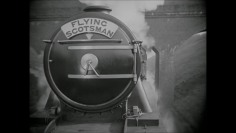 Marriot), who is working his last day before retirement. White’s daughter Joan (Pauline Johnson) is also on the train, having fallen for White’s new fireman, Jim (Ray Milland). As well as being Milland’s first starring role, the film is also notable for all the stars doing their own stunts, including Pauline Johnson who was doubly challenged by wearing high heels while hanging off the side of the train. Find out more at heyuguys.com . Presented as part of the Hippodrome Silent Film Festival. With live musical accompaniment by Jane Gardner . Bo’ness Station, Bo’ness Link
Marriot), who is working his last day before retirement. White’s daughter Joan (Pauline Johnson) is also on the train, having fallen for White’s new fireman, Jim (Ray Milland). As well as being Milland’s first starring role, the film is also notable for all the stars doing their own stunts, including Pauline Johnson who was doubly challenged by wearing high heels while hanging off the side of the train. Find out more at heyuguys.com . Presented as part of the Hippodrome Silent Film Festival. With live musical accompaniment by Jane Gardner . Bo’ness Station, Bo’ness Link
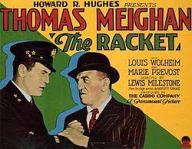 The Racket (Dir. Lewis Milestone, US, 1928) (Screening format – not known, 84mins) Nominated for best picture in the first ever Oscars, The Racket is a cracking gangster picture featuring the charismatic Louis Wolheim as a bootlegger pursued by Thomas Meighan’s Chicago copper, with Marie Prevost’s vengeful ‘chantoose’ in tow. In 1928, Moving Picture News noted that ‘The Racket is much better than usual underworld picture.’ The Racket was one of the movies that started
The Racket (Dir. Lewis Milestone, US, 1928) (Screening format – not known, 84mins) Nominated for best picture in the first ever Oscars, The Racket is a cracking gangster picture featuring the charismatic Louis Wolheim as a bootlegger pursued by Thomas Meighan’s Chicago copper, with Marie Prevost’s vengeful ‘chantoose’ in tow. In 1928, Moving Picture News noted that ‘The Racket is much better than usual underworld picture.’ The Racket was one of the movies that started  the cycle of gangster pictures that would lead to Little Caesar (1931), The Public Enemy (1931) and Scarface (1932). It’s also one of producer Howard Hughes’ most sought after titles and has been out of distribution for decades. The film’s success led to Milestone’s triumph two years later with All Quiet on the Western Front (1930) with Louis Wolheim playing the gruff Sergeant Katczinsky. Despite its popularity however, The Racket was banned in Chicago just as the play it was based on had been, as being a little too uncomfortable for the city of Al Capone. Hughes remade the movie in 1951 with Robert Ryan in the gangster role and the original remained locked up in his personal vault. Find out more at nitratediva.wordpress.com. Presented as part of the Hippodrome Silent Film Festival. With live musical accompaniment by Mike Nolan and Frank Bockius. Hippodrome Cinema, Bo’ness Link
the cycle of gangster pictures that would lead to Little Caesar (1931), The Public Enemy (1931) and Scarface (1932). It’s also one of producer Howard Hughes’ most sought after titles and has been out of distribution for decades. The film’s success led to Milestone’s triumph two years later with All Quiet on the Western Front (1930) with Louis Wolheim playing the gruff Sergeant Katczinsky. Despite its popularity however, The Racket was banned in Chicago just as the play it was based on had been, as being a little too uncomfortable for the city of Al Capone. Hughes remade the movie in 1951 with Robert Ryan in the gangster role and the original remained locked up in his personal vault. Find out more at nitratediva.wordpress.com. Presented as part of the Hippodrome Silent Film Festival. With live musical accompaniment by Mike Nolan and Frank Bockius. Hippodrome Cinema, Bo’ness Link
24 March
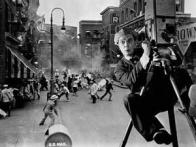 The Cameraman (Dir. Edward Sedgwick/Buster Keaton, US, 1928) (Screening format – not known, 67mins) Buster (Buster Keaton) meets Sally (Marceline Day), who works as a secretary for the newsreel department at MGM, and falls hard. Trying to win her attention, Buster abandons photography in order to become a news cameraman. In spite of his early failures with a motion camera, Sally takes to him as well. However, veteran cameraman Stagg (Harold Goodwin) also fancies Sally, meaning Buster will need to learn how to film quickly before he loses his job. Find out more at slantmagazine.com With live musical accompaniment by Lillian Henley. Palace Cinema, Broadstairs. Link
The Cameraman (Dir. Edward Sedgwick/Buster Keaton, US, 1928) (Screening format – not known, 67mins) Buster (Buster Keaton) meets Sally (Marceline Day), who works as a secretary for the newsreel department at MGM, and falls hard. Trying to win her attention, Buster abandons photography in order to become a news cameraman. In spite of his early failures with a motion camera, Sally takes to him as well. However, veteran cameraman Stagg (Harold Goodwin) also fancies Sally, meaning Buster will need to learn how to film quickly before he loses his job. Find out more at slantmagazine.com With live musical accompaniment by Lillian Henley. Palace Cinema, Broadstairs. Link
 Laurel & Hardy Double Bill The boys in bowlers are back! Join them for a glorious afternoon in the company of the world’s best-loved comedy team. It begins with The Second Hundred Years (Dir. Fred Guiol, US, 1927) the duo’s first film together after their ‘official’ pairing, which finds Stan and Ollie staging a bungled prison-break. Watch out for co-star James Finlayson – the beloved local boy from Larbert – as the aristocratic host of the party they clumsily gatecrash. The finishing touch to the programme is… The Finishing Touch (Dir. Clyde Bruckman, Leo McCarey, US, 1928) in which the boys are hilariously inept handymen, charged with building an alarmingly flimsy house under the unforgiving eye of the plot owner and a nurse from the neighbouring sanitorium. Joyous and packed with perfectly timed gags these classic Laurel and Hardy gems are just the ticket for guaranteed belly laughs. Presented as part of the Hippodrome Silent Film Festival. Introduced by Neil Brand. With live musical accompaniment by Stephen Horne and Frank Bockius. Hippodrome Cinema, Bo’ness Link
Laurel & Hardy Double Bill The boys in bowlers are back! Join them for a glorious afternoon in the company of the world’s best-loved comedy team. It begins with The Second Hundred Years (Dir. Fred Guiol, US, 1927) the duo’s first film together after their ‘official’ pairing, which finds Stan and Ollie staging a bungled prison-break. Watch out for co-star James Finlayson – the beloved local boy from Larbert – as the aristocratic host of the party they clumsily gatecrash. The finishing touch to the programme is… The Finishing Touch (Dir. Clyde Bruckman, Leo McCarey, US, 1928) in which the boys are hilariously inept handymen, charged with building an alarmingly flimsy house under the unforgiving eye of the plot owner and a nurse from the neighbouring sanitorium. Joyous and packed with perfectly timed gags these classic Laurel and Hardy gems are just the ticket for guaranteed belly laughs. Presented as part of the Hippodrome Silent Film Festival. Introduced by Neil Brand. With live musical accompaniment by Stephen Horne and Frank Bockius. Hippodrome Cinema, Bo’ness Link
 Queen Of Sports (Dir. Yu Sun, China, 1934) (Screening format – not known, 99mins) Chinese superstar Li Li-li fizzes with vitality in this wholesome drama about a young girl who learns that there is no “i” in “team”. The legendary director Sun Yu created this sporty narrative specifically for Li-li whose roles tended to characterise her as energetic, wholesome and desirable. Her athletic abilities are woven into the
Queen Of Sports (Dir. Yu Sun, China, 1934) (Screening format – not known, 99mins) Chinese superstar Li Li-li fizzes with vitality in this wholesome drama about a young girl who learns that there is no “i” in “team”. The legendary director Sun Yu created this sporty narrative specifically for Li-li whose roles tended to characterise her as energetic, wholesome and desirable. Her athletic abilities are woven into the  story of Lin Ying who arrives in Shanghai, full of beans and competitive spirit, eager to take up her training at a sports college. Temptations abound in the big city but luckily her stern, handsome tutor is on hand to make sure she stays on track. But for all its fun, the film has a broader political message. It espouses ideas promoted in the Nationalist government’s New Life Movement,
story of Lin Ying who arrives in Shanghai, full of beans and competitive spirit, eager to take up her training at a sports college. Temptations abound in the big city but luckily her stern, handsome tutor is on hand to make sure she stays on track. But for all its fun, the film has a broader political message. It espouses ideas promoted in the Nationalist government’s New Life Movement,  launched earlier in the year, especially that China needed to strengthen the body politic by strengthening actual bodies, reflecting growing concerns over Japanese militarism and the economic depression that hit the country in the early 1930s. By the time she died in 2005, aged 90, Li Li-li was the Grande Dame of the Chinese film industry having survived the envy of Madame Mao and subsequent denunciation and torture during the cultural revolution (in which her husband was killed). Find out more at wikipedia.org Presented as part of the Hippodrome Silent Film Festival. With live musical accompaniment by Meg Morley and Frank Bockius . Hippodrome Cinema, Bo’ness Link
launched earlier in the year, especially that China needed to strengthen the body politic by strengthening actual bodies, reflecting growing concerns over Japanese militarism and the economic depression that hit the country in the early 1930s. By the time she died in 2005, aged 90, Li Li-li was the Grande Dame of the Chinese film industry having survived the envy of Madame Mao and subsequent denunciation and torture during the cultural revolution (in which her husband was killed). Find out more at wikipedia.org Presented as part of the Hippodrome Silent Film Festival. With live musical accompaniment by Meg Morley and Frank Bockius . Hippodrome Cinema, Bo’ness Link
 The Norrtull Gang (Dir Per Lindberg, Swe, 1923 ) (Screening format – not known, 86mins ) Adapted by Hjalmar Bergman, renowned director Victor Sjöström’s frequent writer, from Elin Wägner’s 1908 novel about the lives of four working women
The Norrtull Gang (Dir Per Lindberg, Swe, 1923 ) (Screening format – not known, 86mins ) Adapted by Hjalmar Bergman, renowned director Victor Sjöström’s frequent writer, from Elin Wägner’s 1908 novel about the lives of four working women  who room together in Stockholm and confront often harsh economic and social conditions. Balancing life and work in turn-of-the-century Stockholm, the women are searching for respect, opportunity and romance. Pegg, Baby, Eva and Emmy are four young women holding down office jobs and sharing a rented flat in Norrtull Street. With grace and gentle humour Pegg narrates the story of how the firm friends try to navigate their careers in the male-dominated office culture… The world may be modernising fast, but at their workplace the patriarchy is alive and kicking. Find out more at silentfilm.org. Presented as part of the Hippodrome Silent Film Festival. With live musical accompaniment by John Sweeney . Hippodrome Cinema, Bo’ness Link
who room together in Stockholm and confront often harsh economic and social conditions. Balancing life and work in turn-of-the-century Stockholm, the women are searching for respect, opportunity and romance. Pegg, Baby, Eva and Emmy are four young women holding down office jobs and sharing a rented flat in Norrtull Street. With grace and gentle humour Pegg narrates the story of how the firm friends try to navigate their careers in the male-dominated office culture… The world may be modernising fast, but at their workplace the patriarchy is alive and kicking. Find out more at silentfilm.org. Presented as part of the Hippodrome Silent Film Festival. With live musical accompaniment by John Sweeney . Hippodrome Cinema, Bo’ness Link
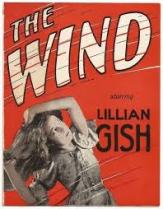 The Wind (Dir. Victor Sjöström, US. 1928) (Screening format – not known, 95mins) Innocent and naive Letty Mason (Lillian Gish) moves from her Virginia home to Sweet Water on the western prairies to live on the ranch of her cousin
The Wind (Dir. Victor Sjöström, US. 1928) (Screening format – not known, 95mins) Innocent and naive Letty Mason (Lillian Gish) moves from her Virginia home to Sweet Water on the western prairies to live on the ranch of her cousin  Beverly (Edward Earle) , his wife Cora (Dorothy Cumming) and their three children. Letty quickly learns how inhospitable the environment in Sweet Water is, the most obvious feature being the incessant wind. But equally inhospitable are the unrefined lives of the people of Sweet Water, to which Letty is unaccustomed, and Cora, who believes Letty has come to steal Beverly away from her. As a result, Cora orders Letty out of her and Bev’s house. With no money, Letty is forced to accept one of the marriage proposals she receives, from Lige Hightower (Lars Hanson), a man who she does not love. But greater terrors loom and the incessant wind brings with it the prospect of madness. As the film shifts from low-key naturalism to
Beverly (Edward Earle) , his wife Cora (Dorothy Cumming) and their three children. Letty quickly learns how inhospitable the environment in Sweet Water is, the most obvious feature being the incessant wind. But equally inhospitable are the unrefined lives of the people of Sweet Water, to which Letty is unaccustomed, and Cora, who believes Letty has come to steal Beverly away from her. As a result, Cora orders Letty out of her and Bev’s house. With no money, Letty is forced to accept one of the marriage proposals she receives, from Lige Hightower (Lars Hanson), a man who she does not love. But greater terrors loom and the incessant wind brings with it the prospect of madness. As the film shifts from low-key naturalism to 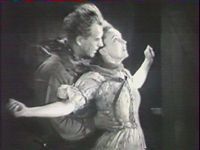 full-on melodramatic symbolism, Sjöström – shooting the climactic sandstorm in the Mojave desert– makes the weather an astonishingly vivid index of the protagonist’s mental state. Despite being a critical and popular failure on its release, The Wind is now considered a classic, featuring one of Gish’s greatest performances. But it marked the end of an era being the last silent film starring Gish, the last directed by Sjostrom, and the last major silent released by MGM. Find out more at silentfilm.org. Presented as part of the Hippodrome Silent Film Festival. Introduced by Bryony Dixon, Curator of Silent Film, BFI National Archive. With live musical accompaniment by Stephen Horne and Frank Bockius . Hippodrome Cinema, Bo’ness Link
full-on melodramatic symbolism, Sjöström – shooting the climactic sandstorm in the Mojave desert– makes the weather an astonishingly vivid index of the protagonist’s mental state. Despite being a critical and popular failure on its release, The Wind is now considered a classic, featuring one of Gish’s greatest performances. But it marked the end of an era being the last silent film starring Gish, the last directed by Sjostrom, and the last major silent released by MGM. Find out more at silentfilm.org. Presented as part of the Hippodrome Silent Film Festival. Introduced by Bryony Dixon, Curator of Silent Film, BFI National Archive. With live musical accompaniment by Stephen Horne and Frank Bockius . Hippodrome Cinema, Bo’ness Link
27 March
 Nosferatu (Dir. F W Murnau, 1922) (Screening format – Digital, 96mins) A German Expressionist horror masterpiece starring Max Shreck as the vampire Count Orlok. The film was an unauthorised adaption of Bram Stoker’s ‘Dracula’ with names and other details changed because the studio could not obtain the rights to the novel. Stoker’s heirs sued over the adaption and a court ruling ordered that all copies of the film be destroyed. However, a few prints survived and the film came to be regarded as an inspirational master work of the cinema. In the film, Count Orlok travels across Europe leaving a trail of death in his wake. Brilliantly eerie, with imaginative touches which later adaptions never achieved. Find out more at wikipedia.org Introduced by Arike Oke, BFI Executive Director of Knowledge, Learning & Collections. With live musical accompaniment. BFI Southbank, London Link
Nosferatu (Dir. F W Murnau, 1922) (Screening format – Digital, 96mins) A German Expressionist horror masterpiece starring Max Shreck as the vampire Count Orlok. The film was an unauthorised adaption of Bram Stoker’s ‘Dracula’ with names and other details changed because the studio could not obtain the rights to the novel. Stoker’s heirs sued over the adaption and a court ruling ordered that all copies of the film be destroyed. However, a few prints survived and the film came to be regarded as an inspirational master work of the cinema. In the film, Count Orlok travels across Europe leaving a trail of death in his wake. Brilliantly eerie, with imaginative touches which later adaptions never achieved. Find out more at wikipedia.org Introduced by Arike Oke, BFI Executive Director of Knowledge, Learning & Collections. With live musical accompaniment. BFI Southbank, London Link
31 March
 The General (Dir. Buster Keaton/Clyde Bruckman, 1926) + Sherlock Jnr (Dir. Buster Keaton, 1924) (Screening format – not known, 75/45mins) Widely considered one of the greatest films ever made and one of the most revered comedies of the silent era, Buster Keaton’s effortless masterpiece The General sees hapless Southern railroad engineer Johnny Gray (Keaton) facing off against Union soldiers during the American Civil War. When Johnny’s fiancée, Annabelle Lee (Marion Mack), is accidentally taken away while on a train stolen by Northern forces, Gray pursues the soldiers, using various modes of transportation in comic action scenes that highlight Keaton’s boundless, innovative wit and joyful, lighthearted dexterity, to reclaim the train and
The General (Dir. Buster Keaton/Clyde Bruckman, 1926) + Sherlock Jnr (Dir. Buster Keaton, 1924) (Screening format – not known, 75/45mins) Widely considered one of the greatest films ever made and one of the most revered comedies of the silent era, Buster Keaton’s effortless masterpiece The General sees hapless Southern railroad engineer Johnny Gray (Keaton) facing off against Union soldiers during the American Civil War. When Johnny’s fiancée, Annabelle Lee (Marion Mack), is accidentally taken away while on a train stolen by Northern forces, Gray pursues the soldiers, using various modes of transportation in comic action scenes that highlight Keaton’s boundless, innovative wit and joyful, lighthearted dexterity, to reclaim the train and 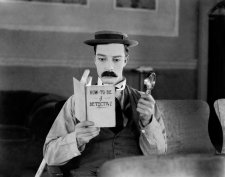 thereby save the South. Find out more at busterkeaton.com . In Sherlock Jr, a kindly movie projectionist (Buster Keaton) longs to be a detective. When his fiancée (Kathryn McGuire) is robbed by a local thief (Ward Crane), the poor projectionist is framed for the crime. Using his amateur detective skills, the projectionist follows the thief to the train station – only to find himself locked in a train car. Disheartened, he returns to his movie theatre, where he falls asleep and dreams that he is the great Sherlock Holmes. Although not a popular success on its initial release, the film has come to be recognised as a Keaton classic with its special effects and elaborate stunts making it a landmark in motion picture history. Find out more at silentfilm.org. With recorded score. Theatres And Museum, Worthing Link
thereby save the South. Find out more at busterkeaton.com . In Sherlock Jr, a kindly movie projectionist (Buster Keaton) longs to be a detective. When his fiancée (Kathryn McGuire) is robbed by a local thief (Ward Crane), the poor projectionist is framed for the crime. Using his amateur detective skills, the projectionist follows the thief to the train station – only to find himself locked in a train car. Disheartened, he returns to his movie theatre, where he falls asleep and dreams that he is the great Sherlock Holmes. Although not a popular success on its initial release, the film has come to be recognised as a Keaton classic with its special effects and elaborate stunts making it a landmark in motion picture history. Find out more at silentfilm.org. With recorded score. Theatres And Museum, Worthing Link
 Nosferatu (Dir. F W Murnau, 1922) (Screening format – not known, 96mins) A German Expressionist horror masterpiece starring Max Shreck as the vampire Count Orlok. The film was an unauthorised adaption of Bram Stoker’s ‘Dracula’ with names and other details changed because the studio could not obtain the rights to the novel. Stoker’s heirs sued over the adaption and a court ruling ordered that all copies of the film be destroyed. However, a few prints survived and the film came to be regarded as an inspirational master work of the cinema. In the film, Count Orlok travels across Europe leaving a trail of death in his wake. Brilliantly eerie, with imaginative touches which later adaptions never achieved. Find out more at wikipedia.org With live musical accompaniment by Hugo Max. Prince Charles Cinema, London Link
Nosferatu (Dir. F W Murnau, 1922) (Screening format – not known, 96mins) A German Expressionist horror masterpiece starring Max Shreck as the vampire Count Orlok. The film was an unauthorised adaption of Bram Stoker’s ‘Dracula’ with names and other details changed because the studio could not obtain the rights to the novel. Stoker’s heirs sued over the adaption and a court ruling ordered that all copies of the film be destroyed. However, a few prints survived and the film came to be regarded as an inspirational master work of the cinema. In the film, Count Orlok travels across Europe leaving a trail of death in his wake. Brilliantly eerie, with imaginative touches which later adaptions never achieved. Find out more at wikipedia.org With live musical accompaniment by Hugo Max. Prince Charles Cinema, London Link
